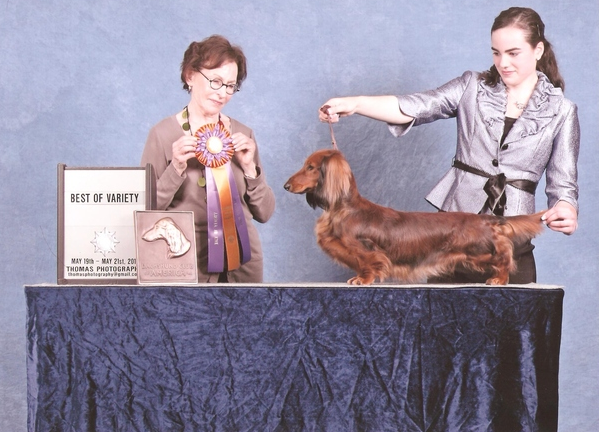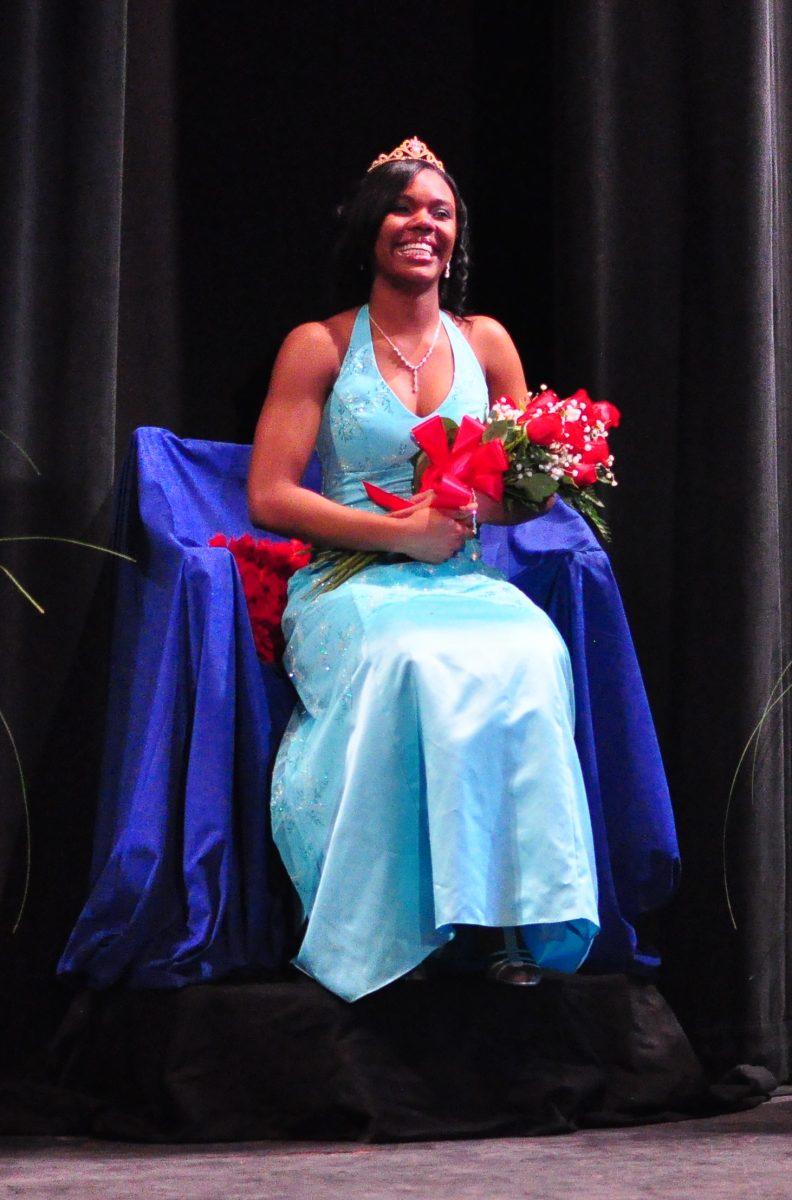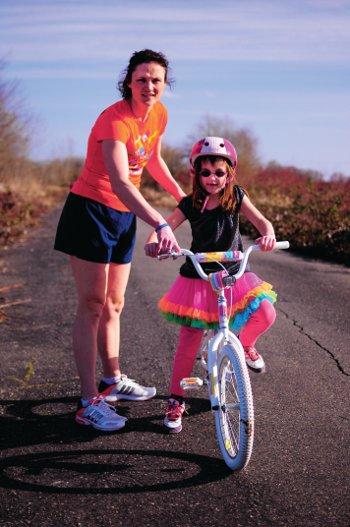Story by Ilan Swartz-Brownstein
Photos by Anna Shepherd and courtesy of Dachshund Club of America
The lights of Madison Square Garden shine down on Amber Leonard’s gold blazer as she and her long-haired Dachshund, Hazel, step into the ring. Leonard guides Hazel around the center floor in front of the judges and hundreds of spectators at the Westminster Dog Show in New York City.
Hazel looks straight ahead, then tilts her head into the turn as they head back to the judges. Leonard and Hazel walk quickly together, moving as one. A voice echoes through the speakers overhead: First place goes to Hazel and Amber Leonard.
“The fact that I have gotten so far, that I am at a point that I never thought I could be at, is the best thing whether I win or lose,” says Leonard.
Leonard is not like many Grant students. Instead of putting up posters of her favorite bands or sports teams in her room, her walls are plastered with pictures of her dogs and the hundreds of awards she has received in competitions. And rather than hanging out with friends after school or worrying about her plans for the weekend, Leonard spends the majority of her free time working with long-haired Dachshunds. Almost every weekend, she competes in dog shows from Oregon to Wisconsin to New York City.
As part of her challenging schedule, Leonard has had to miss large amounts of school, sometimes whole weeks on end. So far this year, she has missed 40 days.
“I never really found a passion until dog shows,” Leonard says. “I didn’t know what it was like to say, ‘Oh, this is my passion.’ It’s like finding your niche. When you succeed at it and get good, it’s all worth it in the end, and it all pays off.”
Because Leonard has developed such a love for dogs, she has given up a number of things to follow her passion. She’s not in band anymore. She doesn’t play basketball. And the piano lessons are on hiatus. Her focus is training Dachshunds.
Liz Mahlum, Leonard’s counselor, says that often when students miss large amounts of school, they struggle to keep up in class. With Leonard, that isn’t the case. “She is tremendously responsible, as a dog handler and as a student,” Mahlum says. “She really takes school seriously. Finding a balance between showing her dogs and being an excellent student is her top priority.”
Amber Leonard is the fifth of seven siblings and her parents say that from a young age she always knew what she wanted. “She was one of my easiest kids,” says her mom, Margaret Leonard. “I never asked her to do homework and never helped her with homework. She would get mad at me when I told her to wear something, like a certain outfit. There was no doing that. It was her way.”
Six years ago after Leonard’s family moved into a house with a larger yard, her mother suggested getting a dog. Margaret Leonard grew up with Dachshunds, so the family decided to get one.
Leonard remembers the first night they brought home Hunter, a long-haired version of the breed. “He cried the whole night and he wasn’t obedient,” Leonard remembers.
She had to spend hours playing with him and walking him every day. Hunter went in the car with Leonard on the way to school and slept with Leonard in her bed. Eventually, “he started following me around,” says Leonard.
Hunter was a lucky omen of things to come. The woman who sold Hunter to Leonard introduced the girl to her friend, Nichole Cooper. Cooper saw that Leonard had a gift with dogs. She was kind and playful with them, treating them like friends. The dogs listened and responded to Leonard in a way they didn’t for others. “Her gift with dogs made her a natural at it,” Cooper recalls.
Before Amber was ready to have a long-haired Dachshund of her own, she borrowed Lily, one of Cooper’s dogs, to become comfortable with the breed. Although Lily wasn’t used to being around younger kids like Leonard, the dog always wagged her tail when she saw the girls, running to sit in her lap.
During those first couple of weeks, Leonard always had a pocket full of cookies for Lily. Leonard was so excited to have someone offer her a dog. She had developed a bond.
“Now, when every Lily sees Amber, she pees,” Cooper says.
Cooper has been her trainer ever since. Cooper told Leonard that dog handling would be good for her. “She brought me to handling classes. I went every week with her,” Leonard remembers. “She  didn’t have a kid, so she basically took me in as her own.”
didn’t have a kid, so she basically took me in as her own.”
A couple times a week, Cooper drove Leonard to training classes in Beaverton. Leonard had to learn how to work with the dog, how to guide it and teach it to turn with her. They’d go to dog shows around Oregon so that Leonard could get a feel for it and become comfortable. Before her first competitions, she would train at Cooper’s house in Gladstone. ”I was going to every single dog show with her, every weekend, and sometimes during the week,” says Leonard. “We would get up at 5:30 in the morning to drive to shows,” Cooper remembers.
Leonard entered her first dog show at age 11. Although she already owned two Dachshunds named Hunter and Floyd, Hunter could not be used for dog shows because he only had one testicle. With limited money, Leonard decided to co-own a long haired Dachshund named Hazel with one of her trainers.
Because Leonard was training with someone else’s show dog, she was only able to practice half as much as other handlers her age. “I just had to adjust and adapt to it,” says Leonard. She had to spend time with the dog she would be showing just to get used to working together. Leonard bonded with the dogs by walking them, training with them or simply being around them. “She was really excited. She was really interested, really eager to learn,” Cooper remembers.
Leonard’s first competitions had little to no other competitors, allowing Leonard to get comfortable in the ring and handling her dog. As she started to compete against more people, she moved up a bracket that made her competition harder. Within a year, she was already placing in shows, and often winning competitions against handlers who were older and more experienced.
The day after she had won the title of best junior handler, she made the mistake of taking Hazel the opposite way around the ring in another competition. She didn’t place.
Besides the sports, Leonard also had to give up playing recorder in band. She was struggling with going to concerts, practices and making time to learn the songs and practice her recorder. “It just didn’t work,” Leonard remembers. “I couldn’t devote enough time to it. I couldn’t make practices, so I had to give that up. I felt myself going back to dog shows. I always go back to dog shows.”
Today, she spends roughly two hours a day working with her dogs. On the day before a show, she spends four hours with her dogs, and during shows they are together all the time.
Despite all that Leonard has given up and sacrificed, she’s never doubted its worth. “The biggest thing has been knowing that I still succeed, after everything,” she says. “It all ends up working out.”
The first time Leonard missed six days of school for a national competition, she realized how intense and time-consuming dog shows were. “It was really hard to get caught up,” Leonard remembers. “It gets really stressful, but it always seems to work out.”
The day before a big show is usually the busiest time for Leonard. She goes around to each of her teachers beforehand to get a week’s worth of homework and classwork. Since she usually leaves at 6 a.m., Leonard has to pack, get her dog bathed and finish as much homework as she can before she leaves.
As a mother, Margaret Leonard wants her daughter to pay attention to school. “It’s hard when I know she is not at chemistry when they are doing labs, and missing out on some hands-on things at Grant,” she says. “What really impresses me is that she is able to keep up such good grades.”
Leonard says that because of school, she can’t go to all of the shows that she wants to. She feels that she could go further with dog shows if she wasn’t restrained from the work that piles up while she’s away.
She manages to maintain a 3.9 GPA. “I don’t know how I do it, really” she says. She finds it hard to believe that she puts so much time and energy into both school and dog shows.
“I see it as a sport just like tennis or soccer,” she says. “It’s competitive. It’s more in depth than other people see it.”
Although Leonard’s social life is impacted by all of the time she is away, her closest friends are people she meets at shows that share her passion for dogs.
As a sophomore, Leonard is nationally recognized as the top Dachshund handler for three years running in the nation. She’s the top junior handler in the Pacific Northwest, the No. 2 All-Breed handler in the nation, and the youngest National Dachshund Specialty winner in history. “I have gotten to see her turn it into something amazing,” says Cooper.
Cooper acknowledges the immense role that Leonard has played in her life as someone to mentor and teach. “I am so close to her,” Cooper says. “Almost like a parent to her.”
For Leonard, it’s been a worthwhile journey. “I feel proud of myself because I have come so far,” she says.





































